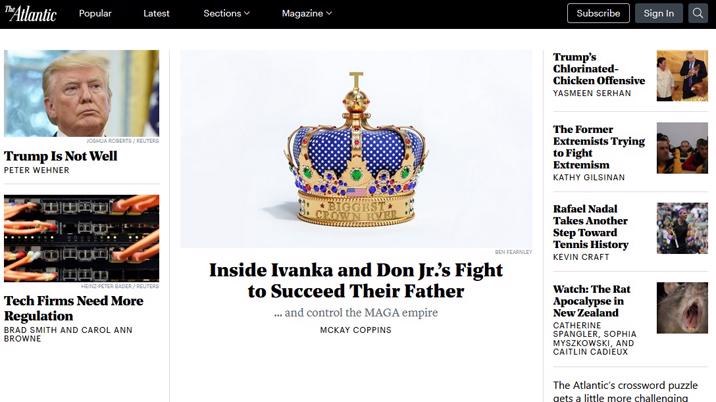
Readers may now view five articles each month before being asked to choose an annual subscription in exchange for unlimited access to The Atlantic’s journalism and other benefits. The publisher has created Digital, Print + Digital, and Premium bundles.
Below and published at The Atlantic are two messages that speak to this decision and this moment: a letter to readers from The Atlantic’s editor in chief Jeffrey Goldberg, and a note to The Atlantic’s staff from Michael Finnegan, president of Atlantic Media.
Editor’s Note
Introducing The Atlantic’s New Subscription Model
Help support 162 more years of journalism that matters.
By Jeffrey Goldberg
In 1864, a journalist named James Gilmore told Abraham Lincoln about his quixotic attempt to negotiate the South’s surrender. Gilmore had crossed Union lines to visit the Confederate president, Jefferson Davis, in Richmond. But Davis had rebuffed the Northern emissary. Lincoln told Gilmore he saw an opportunity to draw attention to Davis’s recalcitrance, and Gilmore proposed publishing an account of his adventure in the New York Tribune.
“Can’t you get it into The Atlantic Monthly?” Lincoln asked. The president was a loyal subscriber to the magazine. “It would have less of a partisan look there.” Such an article in The Atlantic, Lincoln told Gilmore, “could be worth as much to us as a half a dozen battles.”
The Atlantic, just seven years old at the time, had already become America’s indispensable magazine of ideas, argument, and great narrative. Over the next 155 years, our stories would shape the nation, and the world: from Frederick Douglass’s appeal for suffrage, to Alfred Thayer Mahan’s case for the United States as a global power, to John Muir’s essays that helped establish the National Park Service, to Helen Keller’s treatise on industrialization and women’s empowerment. Our writers, including the greats of three centuries—Ralph Waldo Emerson and Harriet Beecher Stowe; Mark Twain, Edith Wharton, and W. E. B. Du Bois; Virginia Woolf, Albert Einstein, Sylvia Plath, David Foster Wallace; and on and on—have helped America understand itself, and understand the world, like no other magazine has ever done.
Today, our battalion of reporters and commentators cover the globe, providing our readers with comprehensive coverage of technological change, cultural dislocation, and political chaos; and with stories that help make sense of daily life. You can see the scope and depth of our journalism in the work we published just this morning: from Jemele Hill making the case for why black athletes should leave white colleges; to James Fallows on how America can find hope in the fall of Rome; to Amanda Mull on the surprising comeback of the hair scrunchie.
Thanks to the quality of our team’s work, The Atlantic has never been bigger than it is right now. More than 30 million people each month visit our website, read our print magazine, watch our documentaries, listen to our podcasts, and attend our live events. But our ambitions are still growing. Our aim is nothing less than to be a standard-bearer for truth in an age of disinformation.
From the very first issue—cover price 25 cents—our magazine has relied on readers who recognize the value of ideas; who believe that rigorous reporting, critical thinking, independent analysis, and beautiful writing are things worth cherishing.
To ensure that The Atlantic has a bright future, we are today introducing a new digital-subscription service. The Atlantic turns 162 in November. My dream is that the steps we take in this period—a difficult one for our industry, as you no doubt know—will guarantee that our magazine will celebrate its bicentennial as a flourishing and indispensable creator of the world’s best journalism.
Beginning today, you will be able to read five articles each month on our website without cost. If you’d like to read more, you’ll be invited to subscribe for unlimited digital access. The subscription will also grant you a weekly newsletter with insights from our newsroom, plus many other benefits.
You’ll notice more changes in the months to come—from a fresh look to brand-new digital experiences and storytelling platforms. The Atlantic has always been dedicated to ideas that matter, and we are committed to making our work as indispensable to you as your support is to us.
This is the start of our next 162 years. We hope that you will join us on our continuing adventure.
Memo to The Atlantic’s Staff
From Michael Finnegan, President of Atlantic Media
Dear Colleagues:
Today marks an important moment: the relaunch of our subscriptions strategy—and, even more significantly, a new chapter in the history of The Atlantic.
As of this morning, you might not necessarily notice any dramatic changes on our website, save one: When a visitor lands on an article, they’ll see a message, gracefully placed at the bottom of the screen, letting them know they can read four more articles this month. If they’d like to read more than five in total, which we hope they do, we’ll be asking them to subscribe.
This change represents something far bigger than charging for unlimited access to our journalism. It’s about redoubling our focus on building deeper, more continuous, more integral relationships with our readers. We aim to do more than publish and distribute some of the best reporting and storytelling in the business. We want to become an indispensable part of our readers’ lives.
We want The Atlantic to be, for example, the perfect complement to a person’s morning news brief; we want to be their mind-expanding lunch-break read, their intriguing evening wind-down, their considered weekend reflection. Which is to say, we want to become a daily habit.
We believe that our product is right for the market, and for the moment we’re in. First, people have already been paying for The Atlantic, for nearly 162 years. But second, we know from extensive research that there are distinct qualities readers value in our journalism. They appreciate how we constantly strive to uphold our founding promise to be “of no party or clique”—and how our arguments often challenge their preconceived ideas about the world, and run against the grain of popular wisdom. They turn to us to sharpen their perspectives and develop their expertise. They see us as a refuge of remarkable prose.
Readers tell us they love how in one moment they can be reading about America’s fraught political moment; the next, a debate about how early one should arrive at the airport; the next, an argument to upend the business of elite collegiate athletics; and so on. In other words, we’re the place where both the generalist and the specialist, the novice and the expert, can find deeper meaning and intellectual stimulation, so long as they bring a curious mind and an interest in the truth. And, crucially, we’re one of only a handful of national American journalism institutions that has stood for open debate, honest inquiry, and fact-driven reporting and analysis for more than a century and a half.
Getting to today has taken a herculean effort. Our teams have been working tirelessly, over long nights and even some long weekends, on the design of our digital subscription strategy. We have added talent, doubling the product, engineering, and growth teams to ensure we have the right resources, strategies, and partners in place to be successful. And, we’ve significantly expanded our editorial team to provide deeper and wider coverage for our growing and increasingly loyal audience. As our editor in chief, Jeffrey Goldberg, wrote to readers this morning: “Today, our battalion of reporters and commentators cover the globe, providing our readers with comprehensive coverage of technological change, cultural dislocation, and political chaos; and with stories that help make sense of daily life.”
Success starts with a truly exceptional product; I couldn’t be more confident in what we are delivering today, or thankful to the teams who have helped us get here. This is an all-enterprise affair. While not everyone will be working directly on building our consumer-revenue business, we all need to be invested in its success.
The Atlantic has been fortunate to find audiences—and partners who want to reach those audiences—throughout our history. We now need to find many, many more readers who want to regularly engage with and ultimately pay for our journalism. That won’t be easy, but we have all of the raw ingredients and infrastructure to make it happen. Each of us, though, has to own the whole. The Atlantic will only thrive to the degree we all make sure it does.
To put it more succinctly: I couldn’t be more excited to embark on this next phase with you.












